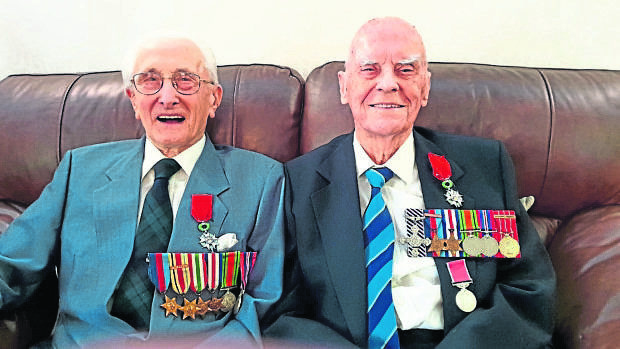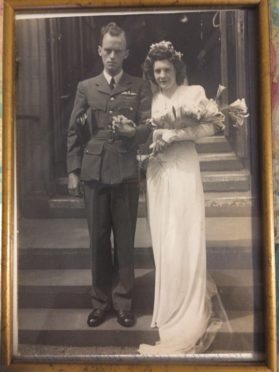There’s a picture of Andrew Mackenzie on the table next to his bed in an Edinburgh care home.
He’s an old fellow now, whose eyes are grey and full of sleep, but the photograph shows the dapper young airman with his sweetheart, Adeline, at their wedding – which he remembers as “the happiest day of my life” – and which marked the start of 72 years of marriage between kindred spirits.
Until recently, Mr Mackenzie, 95, lived in Dornoch and was a Church of Scotland elder of the Sutherland town’s cathedral, a man with a litany of passions from history to golf and charity work to aviation. He knows plenty about the latter, but there again, he was the pilot of a Lancaster bomber which took on German gun emplacements on the Normandy coast to clear the way for the Allied landing parties on D-Day – June 6, 1944.
It was one of many sorties which he made during the conflict, after joining the RAF at the age of 19. He said: “I loved the thought of flying from an early age and I wanted to become a pilot. But I had to make sure I had the abilities to be a pilot.” And, although he lost many comrades, he always managed to return the damaged aeroplanes back to base.
In the process, he won the Distinguished Flying Cross, the Legion d’Honneur, and various other accolades from the Canadian Air Force, but Mr Mackenzie has never been interested in medals or trophies. As he declared, in matter-of-fact fashion: “It was a war which needed to be won. There were many poor lads who never came back. And when I was in the Lancaster, the ‘old man’ of the crew was 23.
“But flying thrilled me. There must have been times when I was frightened or even terrified, but we did what had to be done. That was just the way it was.”
Faith helped him through some of the worst privations and ordeals, such as when the Germans severely damaged his Lancaster, LM104JN-K – affectionately known as Jock’s Box – which resulted in the loss of two engines in the summer of 1944. As he recalled: “We had to fly lower and lower, and ultimately we bombed from just 500 feet, but we were hit by anti-aircraft fire from the ground and one of the shells went through the craft and narrowly missed my mid-upper.
“Fortunately, the shell exploded above us, but as we left the target area, it was apparent that poor old Jock’s Box had been badly hurt. On the way home, I told the crew to prepare to abandon the aircraft. By this time, we had a fighter escort, so we decided to head to the emergency airfield at Woodbridge, where we eventually landed our poor old friend – and that was the last we ever saw of her.”
There was one night where Mr Mackenzie didn’t feel confident the outcome would be so auspicious. As he related to us – I was with the Church of Scotland Moderator, the Rt Rev Susan Brown during my visit – he suffered an out-of-body experience while in the cockpit.
He said: “We were flying towards the Kiel Canal and the Germans laid out the target for Bomber Command to follow. They were trying to lure us in and there was a sense of foreboding. Suddenly, I found myself on the ceiling of my mother’s bedroom and I told her: ‘I’m flying into the barrage flak’. She looked up and said: ‘Don’t worry son, you’ll be all right.” And then I gave myself a shake and I was back in control.
“The next morning, when Mum was at breakfast, my brother noticed she was acting strangely and asked: ‘Are you alright, mum?’ She said: ‘No, I’m not. Andrew was in my room last night. He told me he was flying into barrage flak. I said he would be fine.’
“I can’t explain it myself. But I WAS fine and I came home. It taught me that somebody was looking out for me. But that didn’t mean I wasn’t afraid.”
After the Second World War, he and Adeline moved to North America and Mr Mackenzie joined the Royal Canadian Air Force as a fighter pilot. He was transferred to Germany in the 1950s at the height of the Cold War, when nuclear air raid warnings were a regular occurrence and interceptor scrambles to escort ‘visiting’ Soviet aircraft were common.
Yet, even after retiring from active service, he was determined to help those who had suffered in conflict and took up office as superintendent for the Scottish National Institution for the War Blinded at Linburn.
As his son, Ross Mackenzie, said: “This was the opportunity that Dad was born to fulfil – looking after the needs and providing love and support to Scottish servicemen and women who had lost their sight in the service of their country.
“My mother and father travelled the length and breadth of the UK, raising awareness and funds and reported back to the men and their families on their work. My mum became the trusted sounding board and friend the men’s wives needed and my dad was adored by the lads he was so proud to serve.”
Mr Mackenzie remembered being honoured to host a visit by The Queen to Linburn, where he introduced the redoubtable fellows in his care to Her Majesty.
He said: “I took her through to meet one of the men, Frank Lappin, and she asked: ‘How are you, Frank?’ And, straight away, he replied: ‘I’m fine, hen, how are you daeing yourself?’ It summed up how things were at the time.”
Even as they turned 90 together, Andrew and Adeline were inseparable. He carried on with his church work, helping digitise the rolls at the Cathedral, while she visited the ‘biddies’ at the old folks’ homes and helped with meals.
Eventually, ‘Addy’ told her husband she was tired and couldn’t continue. They talked together and she slipped away quietly, as close to him as ever in January 2016. She left him a message which is too personal to be reproduced here. But Mr Mackenzie still has the note, along with other cherished mementos in his room.
In war and peace, in sickness and in health, and across different continents, their romance is one of the great love stories.

